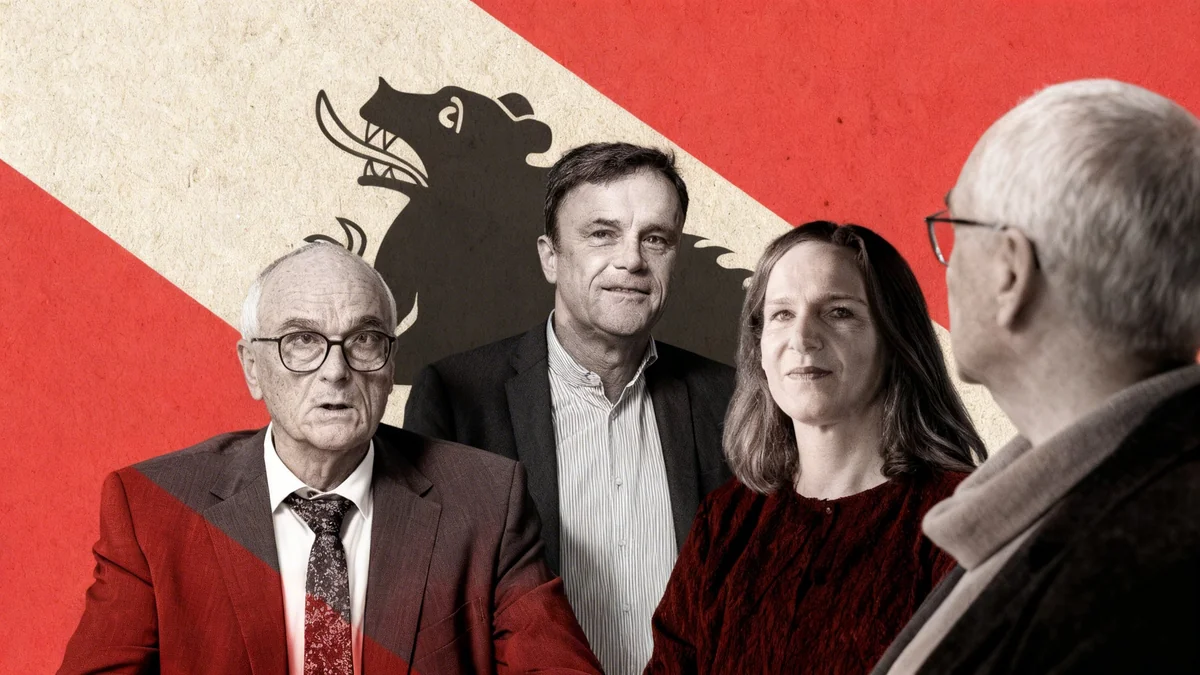Delegates of the FDP in Bern have overwhelmingly endorsed new EU treaty packages, aligning with Federal Councillor Ignazio Cassis. This decision comes after intense internal discussions, particularly highlighting a clear division within the Bernese party regarding Switzerland's future relationship with the European Union.
Key Takeaways
- Bern FDP delegates voted strongly in favor of new EU treaty packages.
- National Councillor Christian Wasserfallen was a prominent critic, standing largely alone in his opposition.
- The canton's strong industrial base heavily influenced the pro-EU stance.
- Discussions were heated, involving prominent figures like former Federal Councillor Johann Schneider-Ammann and Ypsomed CEO Simon Michel.
- The FDP Kantonalpartei president, Sandra Hess, expressed relief at the clear outcome, emphasizing economic benefits.
FDP Delegates Affirm Pro-EU Stance
Last Saturday, at the Wankdorf Stadium in Bern, FDP delegates delivered a decisive vote. They clearly supported the proposed EU treaties. This outcome strengthens Federal Councillor Ignazio Cassis's position on European policy. The vote highlights a prevailing sentiment within the party's Bernese chapter for closer ties with the EU.
The decision was not without significant internal dissent. Christian Wasserfallen, the sole FDP National Councillor from Bern, voiced strong opposition. He argued that the FDP is not solely an economic party. Wasserfallen expressed disappointment following the vote, stating he had hoped for a more critical stance on the treaties.
"I would have wished for a critical attitude towards the EU treaties," Wasserfallen stated. "The treaties represent an irreversible connection to the EU." He also raised concerns about increased migration for non-working individuals.
Heated Debates Preceded the Vote
The period leading up to the FDP's delegate assembly saw heated exchanges among prominent Bernese party members. These discussions, at times, lacked a calm tone. One notable instance involved a guest article published by former Federal Councillor and entrepreneur Johann Schneider-Ammann in the NZZ. He criticized the new agreement with the European Union.
Fact: Bern's Industrial Power
Bern is considered Switzerland's largest industrial canton. In 2024, approximately 58.5 percent of its exports went to the EU, according to the Handels- und Industrieverein des Kantons Bern (HIV).
Simon Michel, CEO of the publicly listed company Ypsomed, based in Burgdorf, responded publicly. Michel, who secured a National Council seat for Solothurn in 2023, has become a leading national proponent of closer EU ties. He criticized Schneider-Ammann's article on LinkedIn, questioning its authorship due to health concerns.
Michel later deleted his post and issued an apology to Schneider-Ammann. This incident underscores the intensity of the debate within the party.
Leadership Welcomes Clear Outcome
Sandra Hess, President of the FDP Cantonal Party and a Bernese Grand Councillor, observed the heightened tension at the delegate assembly. She had advocated for the treaties both before and during the meeting. Hess noted that a large majority of FDP delegates in the Canton of Bern shared her view.
Hess expressed satisfaction with the clear result. "For me, the treaty is a commitment to a high-performing Switzerland," she affirmed. She also stated her relief that the FDP demonstrated a clear position. This sentiment reflects a desire for stability and a defined path forward in Switzerland's European relations.
Background on EU-Switzerland Relations
Switzerland and the EU have a complex relationship, governed by numerous bilateral agreements. The ongoing discussions about new treaty packages aim to update and consolidate these agreements, addressing issues like market access, dispute settlement, and free movement of people. These negotiations are critical for Switzerland's economic stability and its international standing.
The influential board of the Handels- und Industrieverein des Kantons Bern (HIV) also supported the package. While they had minor criticisms, the business association sees the relationship with the EU as extremely vital for the canton. Daniel Arn, President of the HIV and FDP Grand Councillor, highlighted Europe's increasing importance, especially given recent tensions between the USA and Switzerland.
FDP: A Party Focused on Economy
The strong pro-EU vote, particularly in Bern, raises the question of whether the FDP primarily functions as an economic party. Sandra Hess emphasized this point. "We are dependent on good relations with the EU," she stated. "We benefit from SMEs and a high-performing economy. For this, we need access to the EU internal market."
While the party members appeared conciliatory at the assembly, some discontent remains. Christian Wasserfallen reported receiving an unusually high number of resignations following the decision. He noted similar reports from the Zurich Cantonal Party, where dozens of members reportedly left. This indicates a segment of the party feels unrepresented by the pro-EU direction.
Party Membership Changes
In the Canton of Bern, Sandra Hess reported only two known resignations. Conversely, several new members have already joined the party. This suggests that while some members left, the party also attracted new supporters.
The treaties will still need to be presented to the public for a vote. Only then will the cantonal parties formally state their positions. Sandra Hess intends to ensure the cantonal section continues to advocate for a deal with the EU in the future. Wasserfallen chose not to comment on this specific question, indicating the ongoing nature of this debate.
Looking Ahead: Public Vote and Future Strategy
The journey for these EU treaty packages is far from over. The delegate vote is a crucial internal step, but the ultimate decision rests with the Swiss populace. The cantonal parties will play a significant role in shaping public opinion once the treaties are formally presented for a nationwide referendum.
The FDP's clear stance in Bern signals a strategic prioritization of economic ties with the EU. This approach is consistent with Bern's identity as a major industrial canton. The internal debates, however, reveal the complex balancing act the party faces in representing diverse interests while pursuing its core objectives.




